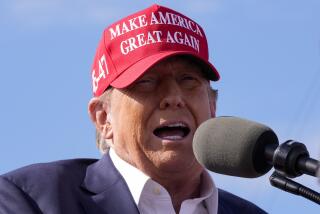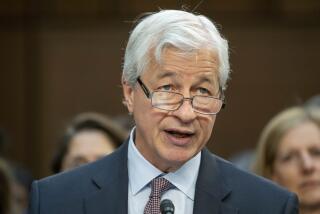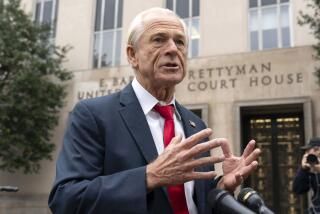Trump names Larry Kudlow top White House economic advisor
A little more than a week after President Trump’s chief economic advisor, Gary Cohn, quit in response to Trump’s sweeping tariffs on imported metals, the White House announced a replacement who is similarly a staunch free-trader with experience on Wall Street and known for his hard-charging style.
What’s different about Larry Kudlow, named Wednesday to be the new director of the National Economic Council, is that he shares the president’s penchant for media promotion and, perhaps most important, has proved to be a loyal supporter and informal advisor from Trump’s early days in the campaign.
Kudlow, a familiar commentator on CNBC who worked in the Reagan administration’s budget office, enters an administration revolving door that on Tuesday saw the abrupt firing of Secretary of State Rex Tillerson.
The 70-year-old Kudlow joins a Trump trade and economics team that includes chief trade official Robert Lighthizer, who is renegotiating the North American Free Trade Agreement, and the recently ascendant China hawk Peter Navarro, a top trade advisor.
White House spokeswoman Sarah Huckabee Sanders confirmed Kudlow’s appointment, which does not need Senate confirmation. “We will work to have an orderly transition and will keep everyone posted on the timing of him officially assuming the role,” she said Wednesday.
Cohn, a former Goldman Sachs executive, announced his resignation March 6 after he lost a pitched battle with Navarro and other nationalists in the administration who had backed Trump’s desire to protect domestic metals manufacturers by levying duties of 25% on imported steel and 10% on aluminum. Canada and Mexico have been exempted, for now, but the measures have angered the European Union and other trading partners, which are contemplating retaliation. The tariffs take effect March 23.
Kudlow, in a recent article for the National Review co-written with the famed supply-side economist Arthur Laffer and Stephen Moore of the conservative Heritage Foundation, called the metals tariffs a tax on American consumers, “a crisis of logic.”
“Even if tariffs save every one of the 140,000 or so steel jobs in America, they put at risk 5 million jobs in industries that use steel,” they wrote. “Steel and aluminum may win in the short term, but steel-and-aluminum users and consumers lose.”
Laffer, in an interview Wednesday, said the tariffs were not as bad as they look because they are more of a negotiating tactic for Trump. Moore argued that Kudlow and other advisors were able to persuade Trump to better target what were originally blanket tariffs. “Now I think Trump is in a place where we can all live with it,” Moore said of the tariffs.
Trump announced the tariffs on the grounds of national security and said he would be open to hearing offers from trading partners that could address U.S. security interests in lieu of the duties. The administration has not yet spelled out on what basis countries could be exempt from the tariffs.
“He’ll give straight advice,” Laffer said of Kudlow, adding that he had talked with Trump about Kudlow last weekend.
“If Trump were to go against Larry’s views, he’d be a loyal soldier, which is just what you need on the White House staff,” Laffer added.
A native of New Jersey, Kudlow graduated from the University of Rochester with a degree in history and did graduate work at Princeton University’s Woodrow Wilson School of Public and International Affairs.
Despite lacking an economics degree, Kudlow worked as a staff economist at the Federal Reserve Bank of New York under Paul Volcker and then became an economist at two well-known Wall Street firms, Paine Webber and Bear Stearns.
In the Reagan administration in the 1980s, Kudlow served as an associate director of economics and planning in the Office of Management and Budget under David Stockman, who said recently that Kudlow would not be a good choice to head the National Economic Council.
“Larry Kudlow has been off the very (deep) deep-end for years on the more important matters of deficits, tax cut magic, Fed money-printing, wild-eyed economic growth rates, and, above all else, incorrigible cheerleading for Wall Street’s serial financial bubbles,” Stockman wrote on his website.
Other economists had a more favorable view of Kudlow. “Larry is a good choice,” said Mark Zandi, chief economist at Moody’s Analytics.
“He is very much in the Republican mainstream regarding economic policy,” he said. “The NEC director’s main function is around process and making sure everyone in the administration with economic expertise in an area is working together. Given that Larry is smart, articulate, very collegial and such a nice guy, I think he will do the job admirably.”
At the same time, Zandi and other experts wondered how Kudlow’s free-trade stance will square with Trump’s anti-globalization sentiments, not to mention with strident protectionists like Navarro.
In an interview on CNN last week, Navarro criticized Kudlow on trade, along with Treasury Secretary Steven T. Mnuchin, who worked with Kudlow on Trump’s tax policy in 2016.
“Larry and Steve have never, ever supported the president on trade,” Navarro said, adding that they are “dead wrong on the economics.”
Follow me at @dleelatimes







